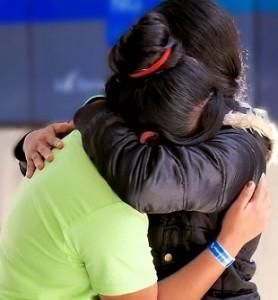When the mother entered the interview room in her orange jumpsuit, she looked dejected and thin, as if she hadn’t been eating or sleeping well.
She sat at a table, across from her legal team. Among them was Alejandra Acuña, a CSUN assistant professor of social work who as a licensed clinical social worker is qualified to conduct psychological evaluations. The professor sat with a lawyer from the pro bono public interest law firm Public Counsel and a translator who spoke the mother’s native language, Q’eqchi’, a Mayan dialect rarely spoken in the United States. U.S. Immigration and Customs Enforcement (ICE) officers watched through a window.
The mother had fled to the United States seeking asylum from Guatemala, where her abusive ex-husband had threatened to kill her. Now her hands trembled as she talked, and she picked at her nails, Acuña observed. The mother, identified in court documents as “J.P.,” said she couldn’t get the images out of her mind: the thoughts and memories of the day the government separated her from her 16-year-old daughter.
The legal team was interviewing J.P. in July 2018 at the James A. Musick Facility jail in Irvine, which contracted with ICE to hold detainees, while her daughter was in Phoenix, held at a shelter facility for minors separated from their parents.
J.P. couldn’t read, write or understand the languages spoken by her guards, and for weeks she didn’t understand where her daughter was or if she would ever see her again.
“It’s emotional, because I’m a mom and I know how much I love my daughter,” Acuña said. “I get that connection, and I understand that terror of separation. I don’t know if she thought her daughter was down the street or across the world.”
Acuña’s volunteer work that day was similar to the work she’s done numerous times. Every summer, Acuña volunteers to help Public Counsel and the advocacy group Human Rights First with a handful of evaluations, which are typically used in asylum hearings. For J.P., she provided a professional psychological evaluation of a person who had fled their country in hopes of a safer life in America. But this time, Acuña’s evaluation of the mother had a ripple effect — impacting the lives of thousands of migrant families by serving as key evidence in a class-action lawsuit in U.S. District Court against the federal government.
Read the rest of the story at CSUN Today!

